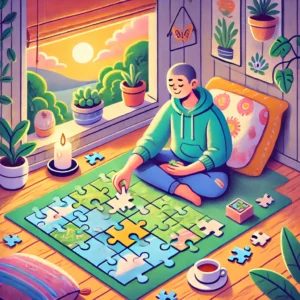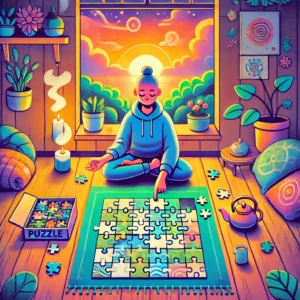
Life can be overwhelming and finding ways to manage stress is more important than ever. Meditation and mindfulness practices are well-known for their ability to reduce anxiety, but did you know that solving a jigsaw puzzle can offer similar benefits?
How Puzzles Calm the Brain
Engaging in jigsaw puzzle meditation creates a calming, immersive experience that helps quiet the mind and shift focus away from daily stressors. The process of searching for pieces, making connections, and watching an image come together naturally promotes relaxation and mental clarity.
Table of Contents
Unlike passive activities like scrolling on your phone or watching TV, puzzling is an active form of mindfulness that keeps the brain engaged while reducing stress and improving focus. It’s the reason we have to have intentional jigsaw puzzle meditation in our lives.
Whether you’re new to puzzles or looking for a way to incorporate mindfulness into your routine, this guide explores how puzzles for stress relief work, the science behind their calming effects, and the best types of puzzles for relaxation. This is what jigsaw puzzle meditation is all about!
Scientific Reasons Why Puzzles Lower Stress
Puzzles Engage Both Sides of the Brain
Jigsaw puzzles activate both the left and right hemispheres of the brain. The left side, responsible for logic and problem-solving, works to analyze piece shapes and placements. The right side, which handles creativity and pattern recognition, processes colors and images.
This balanced brain activity creates a state of focused relaxation, much like meditation, helping to clear mental clutter and reduce stress levels.
Puzzling Induces a “Flow State”
The concept of flow, refers to a state of complete absorption in an activity. When solving a puzzle, the brain becomes fully engaged in matching pieces and forming connections, leading to a meditative-like state where stress fades away.

Flow states are associated with improved mood, reduced anxiety, and a sense of fulfillment, making jigsaw puzzles a perfect tool for mindfulness through puzzling.
Puzzles Reduce Cortisol and Improve Mood
Studies show that activities requiring focus and problem-solving, like jigsaw puzzles, can help lower cortisol levels – the hormone responsible for stress. Engaging in a calming task gives the brain a break from overstimulation and negativity, leading to a greater sense of well-being.
How to Use Puzzles as a Mindfulness Activity
If you’re looking to use puzzles for relaxation, adopting a mindful approach will enhance the benefits. Here’s how to integrate jigsaw puzzle meditation into your daily life:
1. Create a Calming Puzzle Space
Find a quiet, clutter-free space where you can work on your puzzle without distractions. Set up soft lighting, play calming music, or add elements like aromatherapy to enhance the relaxing environment.
2. Focus on the Process, Not the Outcome
Instead of rushing to complete the puzzle, take time to appreciate each piece and how it connects to the whole. Allow yourself to become absorbed in the textures, colors, and shapes, using the puzzle as a form of meditation rather than a task to finish.
3. Solve Puzzles at a Comfortable Pace
Jigsaw puzzles should be a stress-free experience. Choose a piece count and difficulty level that feels enjoyable, not overwhelming. If a puzzle feels frustrating, take a break and return when your mind is clear.
4. Breathe and Be Present
As you work on the puzzle, focus on your breathing and body awareness. Deep, steady breaths help reinforce the meditative aspect of puzzling, keeping you grounded in the present moment.
5. Use Puzzling as a Daily Reset
Incorporate puzzle meditation into your daily routine, whether it’s 10 minutes in the morning to set a calm tone for the day or a relaxing evening activity to unwind before bed.
Best Puzzle Types for Relaxation
Certain puzzle styles are more effective at promoting relaxation and mindfulness. If your goal is to use puzzles for stress relief, consider choosing:
Nature-Themed Puzzles
Scenic landscapes, floral patterns, and ocean views create a visually soothing experience, helping to promote calmness and tranquility.
Gradient & Color-Blending Puzzles
Puzzles featuring smooth color transitions encourage deep focus and color perception skills, making them a great option for relaxation and mental clarity.
Larger-Piece Puzzles
Larger piece puzzles (300-500 pieces) require less strain on the eyes and hands, making them ideal for a gentle, meditative experience.
Minimalist or Abstract Puzzles
Puzzles with simple, abstract designs remove unnecessary visual distractions, allowing for a more focused and calming puzzle session.
Personalized or Custom Puzzles
Using a puzzle made from a personal photo or meaningful image adds an emotional connection, making the experience even more rewarding and enjoyable.

Why Jigsaw Puzzle Meditation Works
Using puzzles for stress relief is an effective and enjoyable way to improve mental well-being while engaging in a mindful, calming activity. The jigsaw puzzle meditation aspect of puzzling is another great enhancement to your life! The repetitive motion of sorting and assembling pieces naturally lowers anxiety levels, helps the mind enter a flow state, and provides a healthy distraction from daily stressors.
Whether you’re a seasoned puzzler or just starting out, incorporating jigsaw puzzle meditation into your routine can be a powerful tool for relaxation and mindfulness.
Next time you need to quiet your mind, step away from screens, grab a puzzle, and experience the stress-relieving benefits of mindful puzzling.
